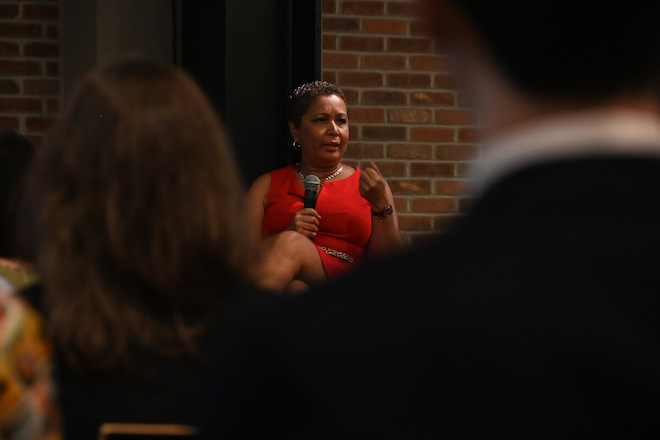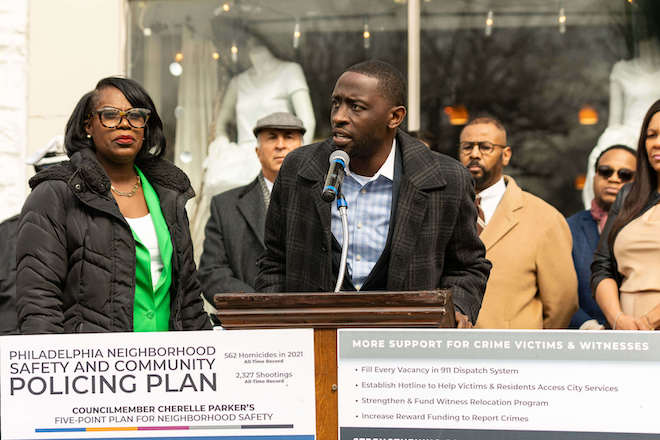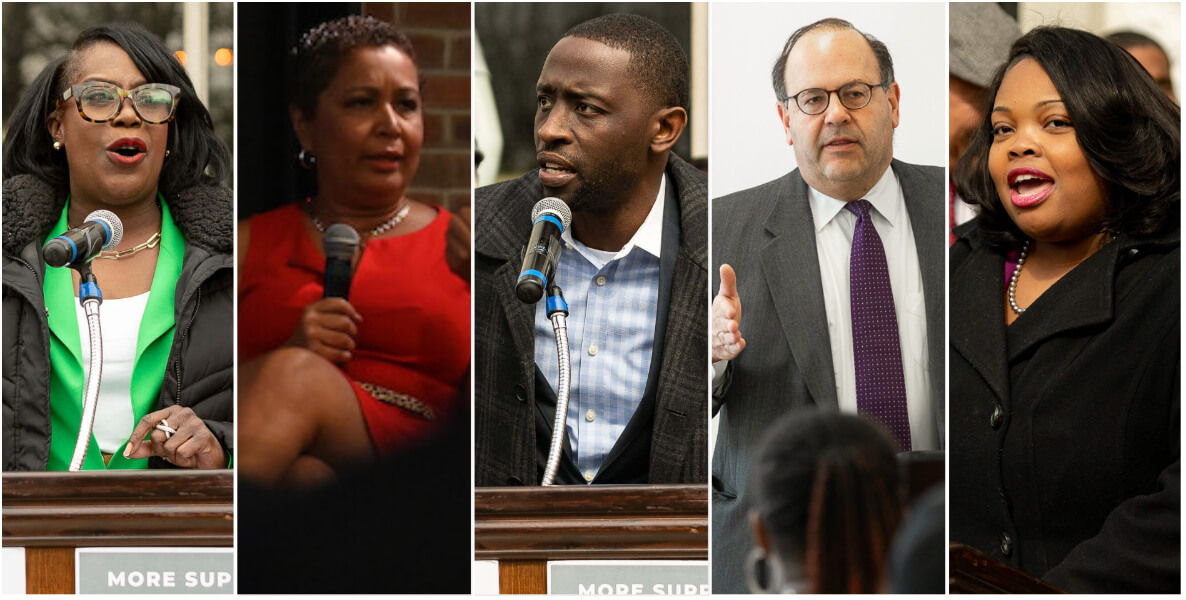At first blush, Council’s business tax cut compromise last week may have seemed like not that big a deal. After all, cutting the Business Income and Receipts Tax (BIRT) — we’re the only city known to man that taxes both income and profits — from 6.2 percent to 5.99 percent and the highest-in-the-nation wage tax by .0498 percent hardly seems revolutionary. Ah, but not in Philly, where, historically — and especially under Mayor Jim Kenney — a tax-happy government has long inhibited the growing of family-sustaining jobs.
As Councilmember Allan Domb — who has made adopting a competitive business tax structure his mission — was quick to point out, the BIRT tax hasn’t been under 6 percent since 1988. Because it amounts to double taxation, the BIRT is particularly harmful to small margin businesses — which so many are in Philadelphia.
At a time when metros are competing against peer cities and suburban rings, how we tax businesses, and especially minority-owned businesses, is a bellwether for civic health. The data is unmistakable: High growth cities create jobs through a smart tax code, as a succession of blue-ribbon tax reform commissions here have urged … to no avail. The compromise last week, meager though it may have seemed, could be a signpost that governing is finally starting to make a comeback in the city of brotherly love and sisterly affection.
What is this governing? It’s what Congressman Dwight Evans means when he proudly proclaims himself part of “the governing wing of the Democratic party.” It’s an eschewing of the mind-numbing ideological shibboleths that dominate national politics, an acknowledgment that, in the miracle that is the American city, there is no liberal or conservative way to fill a pothole. (“There are three political parties in American cities,” former Ithaca, NY, Mayor Svante Myrick said at our 2020 Ideas We Should Steal Festival: “Democrats, Republicans, and mayors.”) It’s a commitment to the practical art of getting tangible stuff done for one’s fellow citizens. It is the triumph of reasonableness over the playing of the blame game.
“We’re at a point of enormous federal investment,” says Bruce Katz. “It would seem that what you want to talk about is how do you invest with a purpose so that, after this, Philly seems like it’s having a leapfrog effect?”
That’s what last week’s business tax cuts signified. I’ve long lamented the degree to which righteously angry progressives responded to Trumpism as Trump would have, though it was totally understandable, right? Instead of doubling down on we’re-all-in-this-together problem-solving, progressives responded to being demonized by demonizing. That may make sense in the sordid swamp of national politics. But in a city with an eight-to-one Democrat to Republican registration ratio, there’s no excuse for not finding common ground.
But we just may be starting to see a break in the divide. In San Francisco, liberals and Black and Brown folk recalled a radical district attorney; in Minneapolis, voters rejected defunding the police; in New York, Eric Adams stands for common sense policing and reform; in Charlotte, North Carolina, the private and public sectors have come together to flood Black and Brown entrepreneurs with startup capital.
No one in any of those cities are mimicking Nixon-like mantras of law and order or Ronald Reagan-like talking points of supply-side economics. Instead, they’re trying to problem-solve. Was last week’s compromise a sign that Philly may be awakening from its own ideological fever dream?
Here, for your consideration, are a few reasons to suspect it is
The Rise of the Diverse Chambers. In the past, I’ve been critical of the Greater Philadelphia Chamber of Commerce — in an Inquirer column a decade ago, headlined “Philly Has No Business Plan,” I took it to task for paying mere lip service to inclusive growth strategies. But, under chairperson Sue Jacobson, the Chamber has at least gotten in the game.
Its Recharge and Recovery program helped the Philly economy adjust during the heart of the pandemic, and the Chamber was influential in the forming of the $100 million GRIT fund — the Philadelphia Growth, Resiliency, Independence, Tenacity fund — which represents the stepping up and coming together of about 30 banks to provide loans through smaller, on the ground Community Development Financial Institutions (CDFIs) to Black and Brown businesses.
Rather than vilify banks, why not work with the ones that are coming forward and committing to flood economically distressed neighborhoods with much-needed capital for aspiring entrepreneurs?
Despite the Chamber’s recent efforts, it suffers from a lack of credibility outside the usual corridors of civic, political and business power. That’s why it was a stroke of genius to allow the diverse Chambers of Commerce to take the public lead this time around — the African American, Hispanic, LGBTQ and Asian American chambers all carried the message.
The rise of the diverse chambers just might point to a new way of doing things. If we’re serious about real inclusive growth creating job growth that open pathways to the middle class, those organizations are the most credible messengers for it.
The heads of those chambers — Regina Hairston, Jennifer Rodriguez, Zach Wilka and Khine Zaw, respectively — impressed, principally because theirs wasn’t a falling on deaf ears “cut taxes so businesses can thrive” argument; instead, they posited a cut in the BIRT as an investment in small businesses, particularly those that are minority-owned.
“They’d been battered by the pandemic,” Domb told me. “It was important for small businesses to feel heard.” Their rallying cry was “Philly Deserves a Raise” — a pithy phrase that advanced a new proposition: That targeted business tax-cutting can actually be a progressive tool.
The rise of the diverse chambers just might point to a new way of doing things. If we’re serious about real inclusive growth creating job growth that open pathways to the middle class, those organizations are the most credible messengers for it. That said, there’s a big difference between the Greater Chamber and the diverse ones, and it’s one that the times call for addressing.
The Greater Chamber has numerous revenue streams and swanky offices at the Bellevue; the diverse chambers have a few employees each and struggle to stay afloat. Perhaps, under incoming Greater Chamber CEO Shellie Cameron, a deal could be struck to somehow lessen the equity gap between the chambers and to make official and permanent the strength-in-numbers strategy we saw from the coalition in this case.
Progressives Without Pragmatism Need Not Apply. Perhaps the most interesting development last week was precisely who was left opposing business tax cuts that would disproportionately help Black and Brown mom and pop entrepreneurs: The three most rigidly progressive councilmembers, Helen Gym, Kendra Brooks and Jamie Gauthier.
A statement from the three “no” votes was straight from the playbook of Bernie Sanders, only without any factual basis. The cuts that Hairston, Rodriguez and the other diverse chamber leaders were championing, Gym, Brooks and Gauthier posited, were “a return to using 1980’s trickle-down economics to hand out tax breaks for wealthy individuals and profitable corporations … ”
At a time when city coffers are more robust than ever — an annual budget of $5.6 billion, nearly $2 billion more than Mayor Nutter’s last budget, plus $1.4 billion in American Rescue Plan funds — they lambasted “a handful of mega-corporations [that have] flourished, and local billionaires [who] increased their profit margins.”
This, of course, is almost as fact-challenged as any delusion Donald Trump has advanced. Philadelphia has — count ‘em — all of three Fortune 500 companies: Comcast, Aramark and Crown Holdings. We are a city of small businesses, not big. Where is all this wealth Gym et al would have us tap into?
Only 5.4 percent of Philadelphians, after all, make $200,000 a year or above, while 25 percent of the city subsists on $21,000 a year for a family of four. The website taxtherichPHL.com names names — only most of the billionaires whose fortunes they would commandeer, like Fanatics’ founder and CEO Michael Rubin or Eagles owner Jeffrey Lurie, don’t even live in the city.
While we’re at it, how, precisely, does a Comcast or an Aramark lobbying for a cut in the wage tax get twisted into an example of Gordon Gekko-like corporate greed? They’re seeking to lessen the tax burden on their employees, because they want to attract talent and grow. Used to be, Democrats were in favor of giving working folks a break.

While Gym, Brooks and Gauthier read slogans from their Moscow on the Delaware playbooks, pragmatic progressives like Maria Quiñones-Sánchez, Cherelle Parker, Isaiah Thomas, Derek Green and Katherine Gilmore-Richardson — not a supply-sider among them — listened to the Black and Brown store owners who were seeking help from their government and decided to put electioneering talking points aside.
That the progressive triumvirate of Gym, Brooks and Gauthier was essentially rendered irrelevant by the inanity of their own argument — that Quiñones-Sánchez et al are, fiscally speaking, somehow modern-day Ronald Reagans — can only bode well for the long overdue return of policymaking that actually addresses real problems in real people’s lives.
So That’s How Politics Is Done. I’ve written ad nauseam of the need for cross-sector collaboration — that cities flourish when strange civic bedfellows come together and find common ground.
Well, between the influence of the diverse chambers; the behind-the-scenes machinations of the Greater Chamber; the critical last-minute phone calls to Council members from longtime civic leaders like Bill Hankowsky and Bill Sasso; and the centering of the city’s two millennial councilmembers, Thomas and Richardson, who together introduced the legislation … you’d be forgiven for concluding that this is a place that knows how to practice politics.
Philadelphia’s great curse is its incrementalism, and lopping a couple of percentage points off business taxes is not going to turbocharge a local economy. It’s a signal, but don’t mistake it for a cure.
Case in point: Domb has worked tirelessly on good government business tax cuts since joining Council seven years ago, and Quiñones-Sánchez and Cherelle Parker were both instrumental in bringing Council President Darrell Clarke along on the tax-cutting path. But, behind the scenes, insider consultants like Mustafa Rashed and his well-connected colleague Holly Kinser knew that all legislative cooperation could blow up if likely mayoral candidates like Domb, Sanchez and Parker all vied for top billing. So mayoral wannabes relinquished the stage to the likes of Thomas and Gilmore-Richardson. When was the last time we saw such cooperation and selflessness in local politics?

Yes, this may have been a modest tax cut. But it was brought about by what could be a burgeoning coalition: The diverse chambers, the millennial officeholders, the private sector honchos working the phones. It may have been the best example of cross-sector collaboration since the ill-fated Amazon pitch a few years ago.
That said, it’s not nearly enough. Philadelphia’s great curse is its incrementalism, and lopping a couple of percentage points off business taxes is not going to turbocharge a local economy. It’s a signal, but don’t mistake it for a cure. Tax cutting is not an economic growth plan. Elsewhere, mayors and civic leaders are doing more than playing with tax rates. They’re rethinking strategies around inclusive growth.
Let’s go on a little tour.
In Newark, New Jersey, where they’ve virtually eliminated shootings, Mayor Ras Baraka has pretty much been trying everything. He’s partnered with the private sector on a $100 million philanthropic fund to invest in Black and Brown businesses that have long been starved for capital.
He’s cajoled seven other New Jersey mayors to join in on the action, so they’re all investing in Black and Latino business owners and real estate developers in their cities. And he’s launched a universal basic income pilot program, delivering $6,000 per year for two years to 400 families facing housing insecurity. (Philly also is dabbling in UBIs this year.)
In Charlotte, North Carolina, as I’ve mentioned before, Mayor Vi Lyles, in the aftermath of George Floyd, put together “The Mayor’s Racial Equity Initiative,” a $250 million public/private partnership to advance racial equity, complete with goals and timetables. Admittedly, it’s gotten off to a rocky start, after it came to light that the woman hired to run the initiative faced serious charges of mismanagement at her last gig and was forced to resign. Regardless of how Lyles implemented her plan, though, the fact remains: It is a plan.
Was last week’s compromise a sign that Philly may be awakening from its own ideological fever dream?
In Chicago, Mayor Lori Lightfoot has also jumped on the guaranteed income bandwagon in her $2.5 billion recovery plan, which uses some $1.9 billion of federal pandemic-related stimulus funds to bring her city’s economy back to life. She doubles down on public safety spending and neighborhood revitalization.
In Detroit, rather than approach private sector involvement with suspicion, the city has partnered with transformative leaders like entrepreneur Dan Gilbert and Ford Motor Company to rebuild landmarks of inner-city ruin into growing, vibrant economic hubs for all of its citizens.
I could go on — cities are leading the way in charting inclusive economic comebacks. But what do all of these examples have in common? Mayors who bring stakeholders together.
“The bottom line is that growth, properly channeled, can have an enormous inclusion effect,” says Bruce Katz, the Citizen contributor who leads Drexel’s Nowak Metro Finance Lab, and who, as the former chief of staff of HUD under President Clinton, has forgotten more about economic development in cities than any of us will ever know. “But you’ve got to be pro-growth to begin with. We’re at a point of enormous federal investment. It would seem that what you want to talk about is how do you invest with a purpose so that, after this, Philly seems like it’s having a leapfrog effect?”
Way back in 1995, when he won the Philadelphia Award, the city’s highest civic honor, the late Jeremy Nowak, our founding chairman, said this: “I think what Philadelphia has to come to terms with is that there are large parts of Philadelphia that have severe devastation and that they’ll never become the neighborhood they were 30 or 40 years, and that the rebuilding of that neighborhood takes a scale and an imagination that is qualitatively different than what we’ve exercised in community development up to now.
And that the same kind of focus we put on trying to create a Convention Center and the same kind of focus we put on trying to keep the Philadelphia Eagles in Philadelphia, both of which I support, is ultimately the kind of focus you have to have in order to rebuild large parts of North Philadelphia or rebuild North Camden or rebuild East Chester.”
That’s why, throughout budget season, I’ve argued for directing some of the untouched ARP dollars to making actual investments in job growth. Imagine if the city matched the $100 million commitment of the GRIT Fund, or contributed to Della Clarke’s Black and Brown business equity fund. Cutting some business taxes is a start, but, as Jeremy knew, it may turn out to be the simplest thing we can do.
![]()
A DEEP DIVE INTO CITY COUNCIL LEADERSHIP
MOST POPULAR
Header photo, from L-R, City Councilmembers Cherelle Parker, Maria Quiñones-Sánchez, Isaiah Thomas, Katherine Gilmore Richardson and Allan Domb | Photo of Sanchez by Sabina Louise Pierce; the rest by Jared Piper



